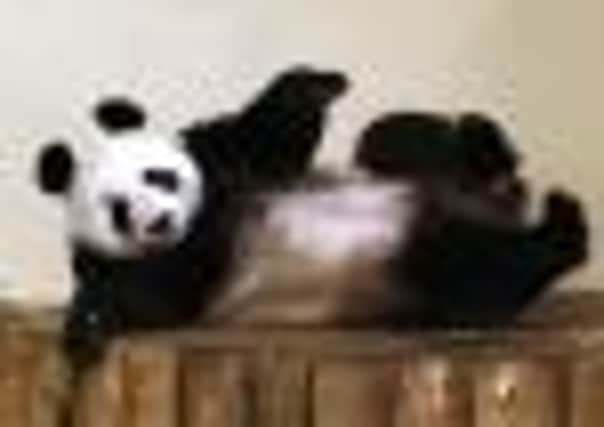Edinburgh Zoo’s pandas to celebrate first anniversary with early night in bid to boost breeding


The pandas, who arrived in Scotland from China’s Ya’an reserve in Chengdu by FedEx plane on 4 December 2011 amidst a blaze of publicity, failed to produce a cub during their short breeding season in April despite high hopes from the Zoo.
However, Iain Valentine, director of animal conservation and research at the Royal Zoological Society of Scotland, who was responsible for bringing the pandas to Edinburgh, said that improved research on the animals since their arrival in the country meant they would be able to boost the chances of a panda birth in 2013.
Advertisement
Hide AdAdvertisement
Hide Ad“The main trigger for hormones is light levels,” said Valentine, who now believes that the male panda, Yang Guang, came into season two weeks after Tian Tian this year, minimising chances of a successful mating.
“Although the temperature in China is similar to that in Scotland the hours of daylight are much longer at this time of year. So, in their enclosures, what we’ll do is turn off the artificial lights at exactly the same time as the sun is going down outside,” he said.
“This will hopefully mean they will come into synch and have more or less the same kind of season.”
Timing is crucial during panda mating, as a female panda only ovulates once a year, meaning the window in which she can conceive can be as short as 36 hours.
During this year’s mating attempt the pair were brought together several times via the panda enclosure’s infamous ‘love tunnel’, resulting in what the Zoo later described as a “close, but no cigar” situation.
Another tactic will be more “bed-swapping” this year, in an attempt to get the pandas used to each other’s scents and signals much earlier on, before they come into season.
“Something we didn’t do particularly well last year and we’ve learned about through the process, is having the two swap enclosures,” he said. “He will get more signals from her and be able to react to that, so when he starts to do more scent marking, which could be as early as January, we will let her into his enclosure.”
Valentine said he was as confident as he could be of a successful mating next year between the pair.
Advertisement
Hide AdAdvertisement
Hide Ad“I have to be confident we are doing everything we can to make sure we can get the animals together and present an opportunity to breed,” he said.
“There are lots of complications and it could be that we can’t get the animals synchronised, but we will do everything we can. Ultimately though, it’s down to the animals’ biology.”
Over half a million people have seen the pandas since they arrived in Scotland last year, including Princess Anne, actress Nicole Kidman and a host of politicians.
“It’s always a high introducing people to the pandas,” said Valentine. “It doesn’t matter if they are dignitaries or royalty, it’s good fun watching people become children again. They all totally get the fact that this is a very special animal.”
Valentine also said that the Zoo had been surprised at the number of Chinese visitors the pandas had received since their arrival.
“We get a lot of Chinese coming to see them,” he said. “Even in China, people don’t see pandas very often.”
And in the year since their arrival the keepers have also discovered that the animals are partial to Scottish honey, despite subsisting mainly on a diet of bamboo.
“We use it as a treat for them, and also as a good way to get medicine into them. It’s Scottish honey, and we’ll go around the enclosure and smear it on the walls for them. They really do love it.”
Advertisement
Hide AdAdvertisement
Hide AdHowever, he admitted that there had been some nerve-jangling moments since the animals’ arrival in Scotland, which is the most northerly place in the world that pandas have ever been kept in captivity. “Getting the animals bedded in was difficult – we hadn’t realised how sensitive they would be and there was a storm on 3 January that led to Yang Guang having a period of illness in which he suffered with colic,” he said.
“At that point our Chinese colleagues had flown back to China, and it was nerve-wracking. You suddenly realise these are our responsibility. Their fortune and conservation are in our hands.”
Valentine is due to fly to China later this month to present his colleagues in the country with an annual report on the animals’ welfare.
The pandas are on loan to Scotland for a period of ten years, after which they will be returned to the Chinese. Any panda cubs born during that time will stay with the mother until the age of two, after which they must be handed over to China. Tian Tian previously gave birth to twin cubs in 2009.
Twitter: @emmacowing